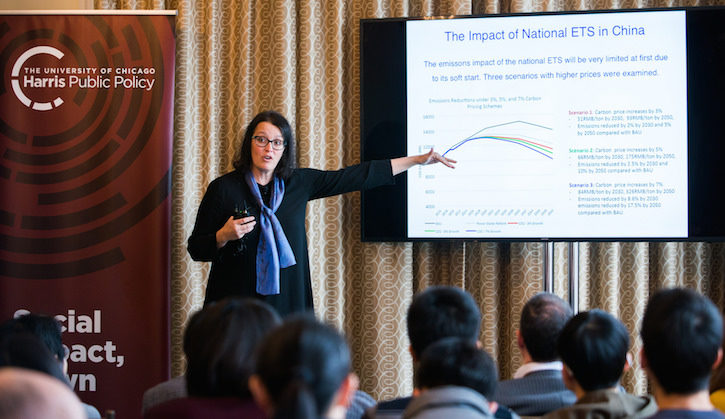The Paulson Institute welcomed climate policy expert Kelly Sims Gallagher for a talk on China’s climate targets as part of the Institute’s Contemporary China Speaker Series at the University of Chicago. A former Senior Policy Advisor in the White House Office of Science and Technology Policy and Senior China Advisor in the Special Envoy for Climate Change office at the U.S. State Department, Gallagher is currently Professor of Energy and Environmental Policy at The Fletcher School at Tufts University, where she directs the School’s Center for International Environment and Resource Policy. In 2014, she helped negotiate a joint agreement between the U.S. and China in which each country articulated its climate targets in order to catalyze other countries to do the same in advance of the Paris Agreement.
To answer the question of whether China will meet its climate change policy targets, Gallagher shared her own research as part of the Climate Policy Lab at the Center for International Environment and Resource Policy. Gallagher analyzed China’s climate change policy targets, underlying motivations, potential policy gaps, and emissions projections based on expert elicitation and modeled the effects of existing and forthcoming policies. She noted that China’s two most important Intended Nationally Determined Contribution (INDC) targets for reducing greenhouse gas emissions are peaking carbon dioxide emissions around 2030 and increasing the country’s share of non-fossil fuels in primary energy consumption to around 20%. Through her research, Gallagher seeks to evaluate the sufficiency of China’s climate policies and identify potential policy gaps for China’s INDC implementation in order to help it achieve its emission targets sooner than 2030.

Gallagher’s research surveyed both Chinese and foreign experts, revealing a general view of subsidies for renewable energy as the most important policies for reducing carbon dioxide emissions to date. These surveys also reveal the power sector and feed-in tariff to be among China’s policies seen as “most in need of reform,” as well as an opinion of electric vehicle subsidies as “over-generous” and no longer necessary for substantial emissions reduction. Furthermore, her research moves beyond expert elicitation, modeling the effects of over one hundred policies on China’s climate change targets compared to business as usual, revealing a peak of carbon dioxide emissions by 2026—instead of 2040—with some power sector reform. Both the expert surveys and modeling in her research find power sector reform and industrial transformation among the most important factors to mitigating China’s emissions. In particular, she noted, “Power sector reform seems to be a precondition for decarbonizing the power system complemented by other policies,” and that carbon pricing, while important, will have a much smaller effect on China’s emissions.





